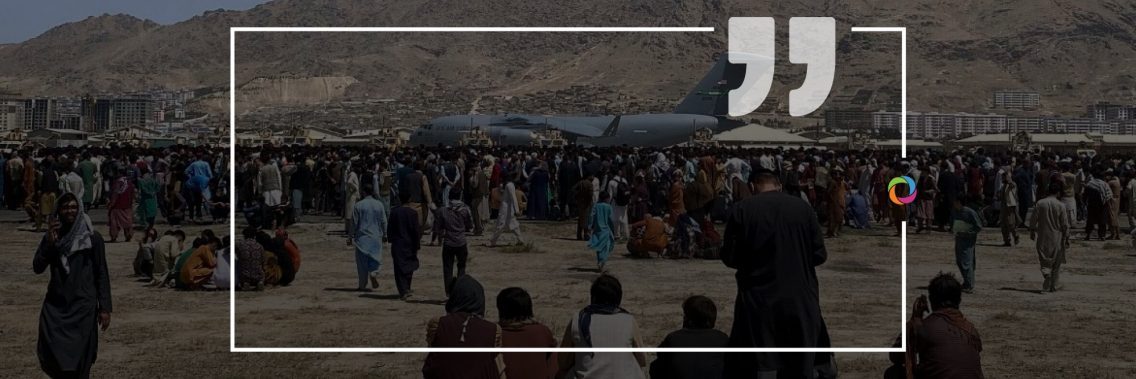The Taliban took power in Afghanistan two weeks before the U.S. was set to withdrawal its troops after a costly two-decade war. The insurgents captured all major cities in a matter of days as Afghan security forces and its allies moved back. The Taliban, a militant group that ran the country in the late 1990s, have again taken control. The question is, what happens next?
How do you comment on America’s withdrawal from Afghanistan?

“It was time that America pulled back. And although the way they did it doesn’t deserve the Nobel Peace Prize, they should have done so long before. The initial reason to be present in Afghanistan (fighting al-Qaeda after the 9/11 attack and preventing Afghanistan from becoming a hotbed for terrorist groups like al-Qaeda) could no longer be justified. What America has trying to accomplish in Afghanistan, and the strategy to do it, has changed with each president (counterterrorism, nation-building, and even a drug interdiction mission). Basically, government leaders have long misled Americans about what was achievable in Afghanistan. America was unprepared for Afghanistan and would never have been able to win this battle.”

“There was never going to be a good time. NATO has been in Afghanistan for 20 years and in all of those years, coalition troops have been killed in insurgent attacks. Hindsight would determine that once the initial aim of the US in capturing Osama Bin Laden had not been achieved, there was little purpose in a full-scale invasion. Once the invasion had taken place, mission creep and the desire to impose western cultures and norms then took over and the ‘nation building’ aim has not been achieved. History will show that nations invading Afghanistan rarely achieve a win. Factors in this withdrawal including the abandonment (as it turned out) of the Bagram Airbase provided the Taliban with an unexpected huge cache of arms, supplies, and vehicles and the release of prisoners the US determined to be exceptionally dangerous. Far more thought should have been given to de-commissioning equipment that was not going to be repatriated. It also denied the use of an airbase with two runways for the subsequent evacuation. The final point is that the commitment of NATO to Afghanistan was such that their withdrawal effectively made the continued involvement of any other nation unsustainable.”

“The recent takeover by the Taliban shocked the international community and also the Afghanistan people as well. The lack of political stability, poverty, unemployment, uncertainty, and most importantly an unclear future for Afghanistan have caused citizens to lose hope for the future, causing them to not only lose interest in the economic and political cycle of the country but also making some of them leave rather than stay in Afghanistan. Over the past 15 years, the private sector has played a critical role in the mitigation of poverty, the creation of jobs, and the flow of money and capital into the economy of Afghanistan. With the Taliban’s recent takeover, everyone is looking after their lives and safety and the market economy is disrupted at the moment from the way it was functioning before. The heartbreaking images from the airport in Kabul only serve to reinforce this message. And there is justifiably a good deal of emotion to go round. The West has invested a lot of blood, time, and money in Afghanistan. NATO Allies must closely monitor the rapidly evolving situation there and NATO must work hard to maintain operations at Kabul international airport to provide key functions under very challenging circumstances. The Alliance must ensure the safe departure of personnel from allied and partner countries, and the Afghans who have helped in NATO’s engagement with Afghanistan.”

“In 2020, when the US announced its decision to withdraw its armed forces from Afghanistan, women’s rights activists and civil society representatives immediately expressed their fears and concerns. Although predictable, the current situation was not at all anticipated. Having failed to participate in the peace negotiations between the Taliban and the US, the existing government was weakened in its legitimacy and quickly gave way to the Taliban. The population thus felt very quickly abandoned, left to its own devices and the various risks of violence from the Taliban and radical groups. Indeed, several radical groups (not part of the Taliban) operate with violence in the country. Will the Taliban be able to control them to avoid violent acts such as bombings and shootings? This is one of the significant issues for the future of Afghanistan.”
What is the impact of the Taliban’s return on international order?

“The Taliban have always said they would come back once the foreign troops had withdrawn. And the return of the Taliban was foreseen by many. Several regional governments including Pakistan, Iran, and Russia have been accused of financially supporting the Taliban. Private citizens from Pakistan, Saudi Arabia the United Arab Emirates, and Qatar are considered to be the largest individual contributors and China and Russia will be happy to see the Western model of spreading democracy and the rule of law having failed. But the Taliban does not represent a single and united group of people or party. Negotiations between parties representing different voices of the Taliban are currently taking place in Kabul. Dynamics in the region and between international players will shift and the outcome of the current talks will make some players happier than others. All will depend on how inclusive and united the new government of Afghanistan will be and remain.”

“The return of the Taliban and the effect this will have has yet to be determined. There can be no doubt that they learned some valuable lessons from their last period of power and how they were regarded internationally. The setting up of a power base in Qatar and the engagement in negotiations tend to show a different approach. The greatest test will be of their command and control and whether or not the provincial commanders follow the party line rather than imposing their own version of ‘Rule of Law”.”
Could the Taliban’s return mean a worse security threat than pre-9/11?

“If a renewed Taliban rule leads to a simple turning back of the clock and there is no room for opposing voices than this will lead to growing turbulence and more instability and insecurity, and international terrorism is more likely to find a safe haven in Afghanistan. But the Taliban of pre 9/11 is not necessarily the same as the Taliban of today. All depends on how inclusively and united the new government in Afghanistan will be able to operate. Within this context, it is extremely important that we in the West keep on talking with the new government and that embassies and humanitarian organizations continue to be present and/or renew their presence in Afghanistan.”

“The Taliban ‘per se’ do not appear to have ever expressed a desire to form anything other than their own caliphate within the country. Consequently, there is no real suggestion that they, as a single organisation, present any real threat to international security. The danger that will arise is the splinter groups that will form a presence such as ISKP, the more militant parts of the Haqqani network, and numerous other groups, and determining what their aims and objectives will be and what influence they will exert over the mainstream Taliban.”
How do you see the future of Afghanistan after the Taliban’s return?

“Afghanistan will face a period of insecurity and it’s very well possible that internal disagreements among the Taliban will worsen the security situation within the country and between Afghanistan and neighbouring countries like Pakistan and Iran. The fear that the rights of many people, especially women and minority groups, will be once more threatened and jeopardized is justified and is a serious concern. At the same time, something had to change. The presence of foreign troops in Afghanistan over the past 20 years did not result in more democracy, prosperity, and the well-being of the population. For a limited elite and the former government, America’s presence was a positive experience (stories about the former president, Ghani, attempting to leave the country in cars filled with U.S dollars that was supposed to be for aid and infrastructure are well known) but for most people on the street, life had become more insecure than under the Taliban regime. The only thing we can hope for is that the current Taliban government gets and stays united.”

“The future of Afghanistan under the Taliban looks particularly bleak. The IMF have already withdrawn their access to funds and other funds throughout the world are frozen. No international agency will be allowed to work within the country without the authority of the Taliban. Any organization that does receive permission would have to seriously consider the safety and security of its staff. On the basis that most international aid goes to the government of the relevant nation and the Taliban are a terrorist organization, how would it be proposed to deliver any aid without directly funding a terrorist organization. Referring to the previous answer, it depends on the success or otherwise of the ‘Command and Control’ system in place. There is also huge potential for an internal civil war again with the almost certain reformation and resurgence of the Northern Alliance under Dostum and the inevitable fight for the territory of the Panshir Valley.”

“Over the last 20 years, a genuine civil society has been created, supported by a fringe of the population that is undoubtedly entitled to demand and defend human rights if the political and social environment gives them the space for discussion and negotiation without resorting to repression and violence. More than ever, the international community must be present with the population, accompany them, reassure them and respond to emergency humanitarian needs, keeping the promotion of human rights and the establishment of peace at the heart of their mandate. The Taliban have announced the outline of their social project; it is too early to assess to what extent human rights will be respected, applied, and defended. Only decisions translated into action will count in the future.”
What do you think will happen to projects that have been implemented /are currently being implemented by international donors?

“I am in contact with HealthNet Afghanistan, funded by the Dutch Government and responsible for the implementation of the Basic Health Care Package (BHCP) and Essential Package (EPHS) in different provinces of Afghanistan. Most employees of HealthNet Afghanistan continue to do their work. The day after the Taliban took over Nangarhar Province, staff members were invited to go to see the new Governor of Nangahar Province who urged employees, including nurses and midwives, to continue their jobs. The projects and initiatives that aim to address human/women rights, including Gender-Based Violence (GBV), have been put on hold but that has been the decision of the organization and the employees themselves. As long as it is not certain what the current Taliban regime is standing for, civil society will wait and might want to re-orient themselves according to what is possible under the current Taliban government. The biggest risk for implemented and current projects is that international donors decide to stop financing projects.”

“Projects that have taken place and projects that have commenced are totally dependent on whether or not they comply with the interpretation of Sharia Law that is going to exist. Schemes that involve women’s rights, girls’ education, etc. I believe have little or no chance of success if the current rhetoric from the Taliban leadership is accepted. The Taliban are only likely to accept help/assistance for projects that conform to their version of how they want to run their country.”
What should the international community do to protect human rights in Afghanistan and prevent ‘civilian slaughter’?

“Starting dialogues with the Taliban, inviting them to talk, listening to them, putting arguments forward that explain why and how the respect for human rights can change the lives of people including their own. Despite their extreme points of view, the Taliban have values in common with people who embrace different cultural values. The Taliban, for example, wants good health for themselves and their family members, just as we do. As long as the international community keeps talking and stays involved, it will be possible to monitor what is happening. Protecting human rights and preventing ‘civilian slaughter’ will become easier if we stay involved and we can hear and see what is happening.”

“This is the most difficult question to answer. In 2009 whilst working with the Afghan Police Policy and Strategy Department, I asked to look at their annual crime figures. In noting that only about 80,000 crimes had been reported in 12 months and understanding that the Minister of the Interior received a daily crime update of every crime reported in the country, I saw that the fourth most prevalent crime reported was ‘Women escaping from the house’, women leaving their home without the permission of their husband. When arrested, it was probable that the woman would receive a custodial sentence in a prison with poor facilities with other women and children who had refused to get married. This was eight years after NATO’s arrival. As we had insufficient impact on the Western view of human rights during the times we were present it can only be expected that we will have even less impact in the future. As Imran Khan pointed out to a US reporter who asked him how he could live with himself knowing that girls in the country next to him would be prevented from going to school, he pointed out that Pakistan had lost 70,000 troops during the time of the conflict without being engaged inside the country and that NATO had been there for 20 years, what were they going to do about it? It is now an undeniable fact that any future military involvement is effectively starting from ground zero.”
Check out more than 50 job opportunities in the conflict sector here.

